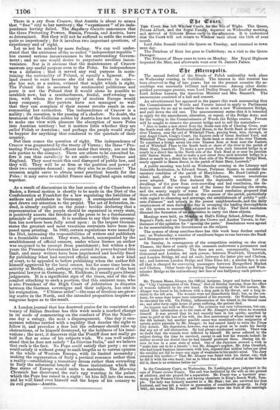As a result of discussions in the last session of
the Chambers at Baden, a formal motion is shortly to be made in the Diet of the Confederation at Frankfort for a law regulating the liabilities of authors and publishers in Germany. A correspondent on the spot draws our attention to the project. The act of federation, in- deed, is already explicit on the point : besides declaring that a representation of the people should be organized in every state, it positively asserts the freedom of the press to be a fundamental principle of government. It is needless to say that this assump- tion has nowhere been fully acted upon : in the largest German states the greatest and most vexatious restraints have been im- posed upon printing. In 1832, certain regulations were issued by the Diet, increasing the responsibilities of writers and publishers to a formidable extent. They were, indeed, accompanied by the establishment of official censors, under whose licence an author was supposed to be exempt from punishment ; but within a few years the Prussian Government has carried its power beyond this limit, and many writers have been imprisoned and heavily fined for publishing what had received official sanction. A new kind of court, to be appealed to before publishing when the author felt himself aggrieved by the local censor, has for some time been in activity at Berlin ; and, perhaps owing to the presence of the best practical lawyer in Germany, M. Eichhorn, it usually gave liberal judgments. It is a significant sign of the times, and of the dis- comfort attaching to such a position, that this eminent man, who is also President of the High Court of Arbitration in disputes between the German sovereigns and their subjects, has sent in his resignation. " Ultimus ardet"—the sons of freedom are grow- ing scarce in the North, and the intended proposition inspires no sanguine hopes as to the result.


























 Previous page
Previous page